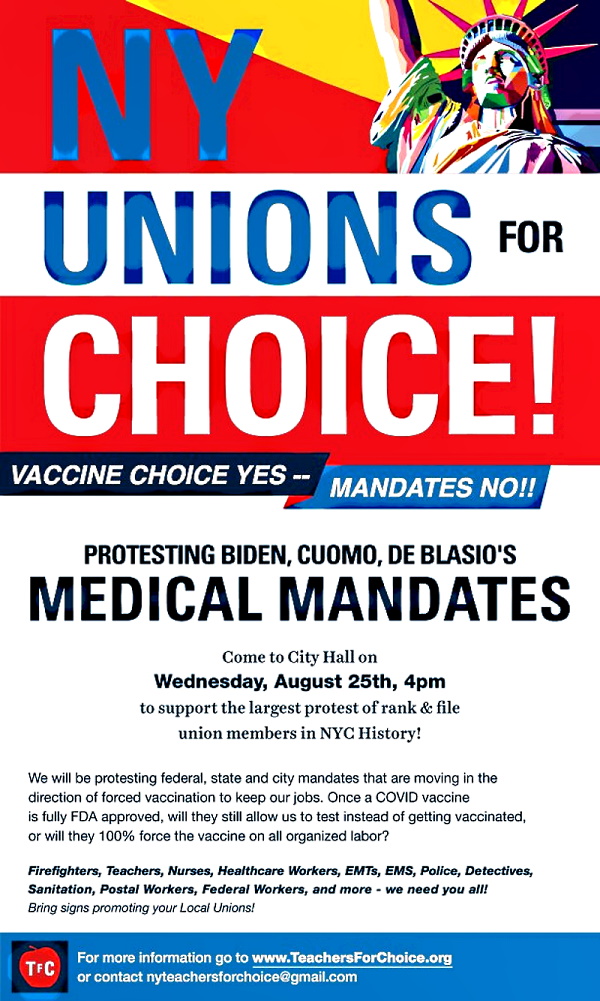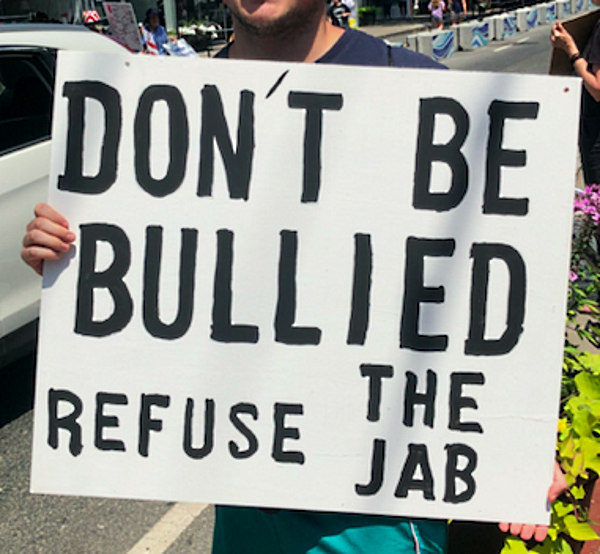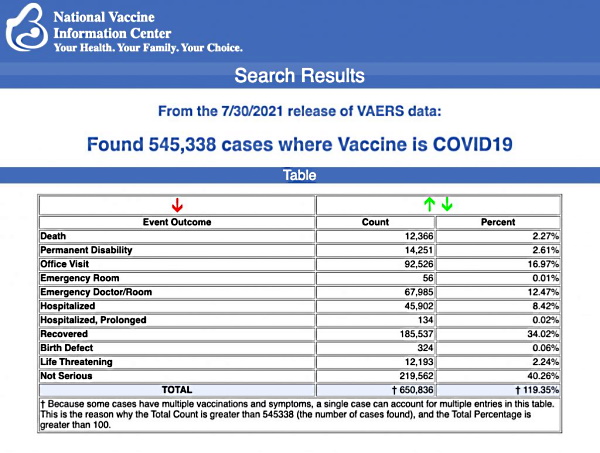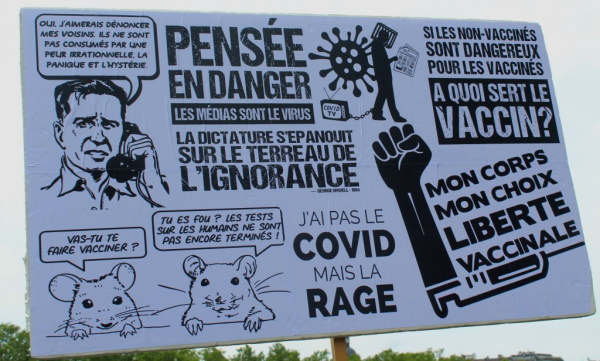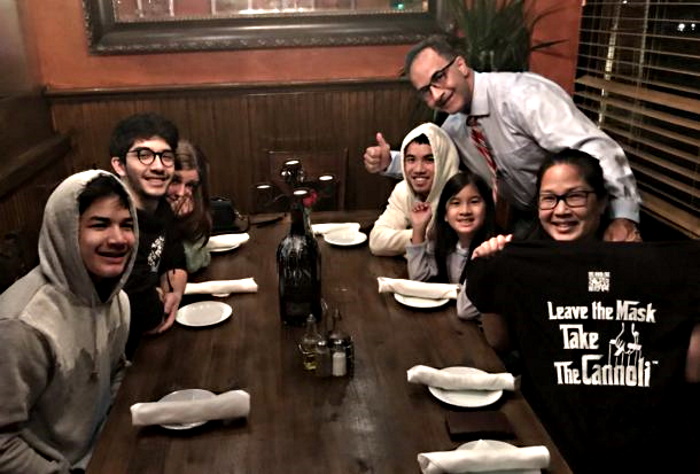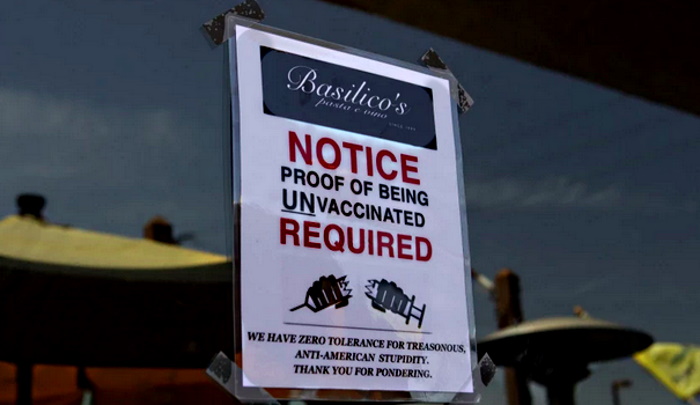by The Solari Report
July 28, 2021
(The Solari Report, revised July 28, 2021)
(View the PDF version here)
The first draft of this form was written by Corey Lynn of Corey Digs but has subsequently been updated by the Solari Team for future events.
[NOTE TO EMPLOYEE: Be sure to document the date and time you submit the form to your employer; also document the date and time and their response if they refuse to sign it. Note that three other Solari Report forms1,2,3 are also available as downloadable PDFs: the “Family Financial Disclosure Form for Covid-19 Injections”; “Notice and Declaration of Parental Authority Requirement of Disclosure and Safety of Medical Treatment/s”; and “Form for Students Attending Colleges or Universities Requiring Covid-19 Injections under Emergency Use Authorization.”]
Introduction
The situation with Covid-19 injections is fluid and evolving rapidly. As of July 2021, three vaccines were being administered in the U.S. under Food and Drug Administration (FDA) emergency use authorization (EUA): the Pfizer-BioNTech and Moderna mRNA injections and the Janssen/Johnson & Johnson adenovirus-vectored injection.
The injections’ regulatory status could soon change. On July 16, the FDA granted priority review to Pfizer’s application for full approval (licensure) of its Covid-19 vaccine for those age 16 and up. Moderna and Johnson & Johnson are also preparing to seek full approval. FDA officials have pledged to issue a decision with respect to the Pfizer application within two months. And though “not intervening in the decision of government scientists,” President Biden predicts full approval by September or October.4
Approval would have significant workplace ramifications. Assuming one or more shots receives full approval, public health experts expect “a wave of Covid-19 vaccine mandates,” confidently anticipating that licensure will “remove a significant legal and public relations barrier for businesses…that want to”—or are being pressured to—require vaccinations for their employees.5 Even under EUA, one federal agency (the Department of Veterans Affairs) has already mandated (on July 26) the experimental injections for its health care personnel, setting a federal precedent for employee mandates that others may soon follow. That same day, the Department of Justice published an opinion stating that it is legal for “public and private entities” to mandate Covid vaccines despite the injections only being approved for emergency use.
American workers who do not wish to accept Covid-19 injections are thus in a difficult position. The genesis of this form was to provide a tool for employees to use within the context of emergency use authorization with employers who attempt to mandate still-investigational Covid-19 injections (Scenario 1). With the possibility of full FDA approval in fall 2021 (Scenario 2), the legal context for U.S. mandates will likely shift in significant ways. In the event of licensure, we will provide an updated form that reflects the altered regulatory circumstances.
Under both scenarios, we anticipate that a form of this type will remain a critically important tool for employees determined to educate employers about the full set of physical and financial risks they are asking workers to incur. Employees should strongly consider reviewing the form with employers and also sharing it with co-workers. This could result in a positive outcome for employees and, if used widely, could be a game-changer.
Scenario 1: Emergency Use Authorization
Many employers are trying to deny employees’ right to choose and their right to bodily integrity by requiring EUA Covid-19 vaccines as a condition of employment. Under EUA, however, such requirements are a violation of the law. (We anticipate that the Department of Justice opinion on the legality of EUA mandates should and will be challenged.) Mandates are also a violation of fundamental human and religious rights.
The provisions of the 2005 Public Readiness and Emergency Preparedness (PREP) Act and a February 2020 declaration by the U.S. Department of Health and Human Services (HHS) Secretary mean that pharmaceutical companies cannot be held liable for injuries or deaths caused by EUA Covid-19 injections.6 However, other companies, institutions, and individuals can be held liable.
On the grounds that the injections are under EUA and are not formally licensed, many health care providers are refusing service to individuals injured by the Covid-19 injections, and health and life insurance companies are declining coverage for vaccine-related injuries and deaths.7 This denial of care and coverage poses a serious threat to the physical and financial well-being of employees presented with a requirement to get a Covid injection—perhaps even more so than the possibility of losing their job for not being vaccinated. Medical bills for vaccinated individuals with serious injuries have already exceeded $1 million in some cases.8 Under the PREP act, the vaccine-injured may submit a claim to the Countermeasures Injury Compensation Program (CICP), but the CICP historically has rejected 92% of claims and has not yet compensated a single Covid injection claim.9
Reviewing this form with employers may open their eyes to the regulations in place and the liability they may face (that they may otherwise not be aware of). If an employee should decide to accept the required experimental Covid-19 injection, the form also provides a mechanism to insist on a signature from the employer’s representative that holds the company liable. If the employer’s representative refuses to sign the form, that may be an indicator of the company’s concerns about potential liability and should prompt an immediate discussion about how the employee can continue working for the company without being injected.
Scenario 2: Full Approval
Before Covid-19, workplace vaccine mandates for adults were on a state-by-state basis and primarily focused on hepatitis B and influenza vaccination in health care settings, often allowing some accommodation for disability or religious beliefs.10 Under a scenario of full FDA approval for Covid-19 injections, a broader cross-section of employers well beyond the health care arena will likely feel emboldened or pressured to impose workplace mandates.11, Evoking the specter of “potentially severe” Covid illness, some commentators are suggesting that the process for granting medical or religious exemptions “may look a little different” (i.e., be more restrictive).12
If Covid-19 injections lose their EUA status and receive full FDA approval, they would no longer enjoy the liability protection conferred by the PREP Act. However, if the FDA extends full approval to children under age 18—as is widely anticipated13—and the Centers for Disease Control and Prevention (CDC) recommends Covid-19 injections for “routine administration” to children (or pregnant women),14 manufacturers and health care providers will be protected from liability for Covid-vaccine-related injuries and deaths under the 1986 National Childhood Vaccine Injury Act (NCVIA).15 From that point on, the only avenue available for compensation would be the notoriously stingy and difficult-to-navigate National Vaccine Injury Compensation Program (NVICP).16
Notes
1. The Solari Report. Family Financial Disclosure Form for Covid-19 injections. Mar. 1, 2021; updated Jul. 28, 2021. https://pandemic.solari.com/family-financial-disclosure-form-for-covid-19-injections/.
2. The Solari Report. Notice and Declaration of Parental Authority Requirement of Disclosure and Safety of Medical Treatment/s. Jun. 24, 2021. https://home.solari.com/notice-and-declaration-of-parental-authority-requirement-of-disclosure-and-safety-of-medical-treatment-s/.
3. The Solari Report. Form for Students Attending Colleges or Universities Requiring Covid-19 Injections under Emergency Use Authorization. May 4, 2021; updated Jul. 28, 2021. https://pandemic.solari.com/form-for-students-attending-colleges-or-universities-requiring-covid-19-injections/.
4. Weiland N, Karni A. Biden predicts the F.D.A. will give final approval to a Covid vaccine by the fall. The New York Times, Jul. 21, 2021.
5. Pettypiece S. Vaccine mandates more likely once FDA grants full approvals, health experts say. NBC, Jul. 20, 2021.
6. Congressional Research Service. The PREP Act and COVID-19: Limiting Liability for Medical Countermeasures. Updated Mar. 19, 2021. https://crsreports.congress.gov/product/pdf/LSB/LSB10443.
7. Del Bigtree interviews 3 medical professionals incapacitated by Covid injections. The Highwire, Apr. 29, 2021. https://www.bitchute.com/video/A4d8FB2cIBTc/.
8. Redshaw M. Woman who nearly died after J&J vaccine stuck with $1 million medical bill, says government should pay. The Defender, Jun. 2, 2021. https://childrenshealthdefense.org/defender/woman-nearly-died-johnson-johnson-vaccine-million-dollar-medical-bill/.
9. Redshaw M. Woman with “life-altering” injuries after COVID vaccine teams up with U.S. senators to demand answers. The Defender, Jul. 14, 2021. https://childrenshealthdefense.org/defender/brianne-dressen-injuries-astrazeneca-covid-vaccine-senators-demand-answer/.
10. National Vaccine Information Center. What laws exist to protect employees and adults from vaccine mandates? https://www.nvic.org/faqs/employee-vaccine-mandates.aspx.
11. Mulligan K, Harris JE. Opinion: More employers should mandates COVID-19 vaccines for workers — for the health of their business. MarketWatch, Jul. 21, 2021.
12. Schnalzer R. Newsletter: Can employers require workers to get flu shots? Los Angeles Times, Sep. 29, 2021.
13. Edwards E. Covid vaccines for kids under 12 expected midwinter, FDA official says. NBC, Jul. 15, 2021.
14. Health Resources & Services Administration. Covered vaccines. https://www.hrsa.gov/vaccine-compensation/covered-vaccines/index.html.
15. Children’s Health Defense. NCVIA: The legislation that changed everything—Conflicts of Interest Undermine Children’s Health: Part II. May 16, 2019. https://childrenshealthdefense.org/news/ncvia-the-legislation-that-changed-everything-conflicts-of-interest-undermine-childrens-health-part-ii/.
16. Children’s Health Defense. $4 billion and growing: U.S. payouts for vaccine injuries and deaths keep climbing. Nov. 19, 2018. https://childrenshealthdefense.org/news/4-billion-and-growing-u-s-payouts-for-vaccine-injuries-and-deaths-keep-climbing/.
Legal Resources
If you find yourself in a predicament with a company that refuses to hear you out, does not provide you with required information, or threatens termination of your employment, here are a few potential resources for attorneys:
Medical/Scientific Resources
Comprehensive, high-integrity medical and scientific information, including briefs and reports summarizing what is known about the risks of Covid-19 injections and adverse events, is available (and routinely updated) at the following websites:
- America’s Frontline Doctors: In addition to its legal resources (see above), AFLDS’ website includes information about Covid-19 treatments, “issue briefs” on post-vaccination complications and other topics, and numerous other resources.
https://americasfrontlinedoctors.org/about-us/mission-statement/
- Children’s Health Defense (CHD): In addition to reporting on vaccine safety topics via its flagship online news outlet The Defender, CHD offers a “Fighting COVID Mandates” toolkit and related resources, a series of eBooks (including eBooks on vaccine mandates and protection of individual rights), a research library, and a “Community Corner.”
https://childrenshealthdefense.org/
- Doctors for COVID Ethics (D4CE): Among the excellent resources provided by this group of doctors and scientists from 30 countries are “Letter to physicians: Four new scientific discoveries regarding the safety and efficacy of COVID-19 vaccines,” which warns that “all physicians must reconsider the ethical issues surrounding COVID-19 vaccination,” and a 23-page Expert Statement outlining the serious risks of the Pfizer injection (European brand name Comirnaty) in children.
https://doctors4covidethics.org/
Form for Employers Requiring Covid-19 Injections under Emergency Use Authorization
NOTE TO EMPLOYER: As your employee, I request that you review this document, provide the requisite information, and sign the form, in regards to your requirement that employees get a Covid-19 emergency use authorization (EUA) investigational vaccine.
1) If I agree to receive an EUA Covid-19 injection, does my employee health insurance plan provide complete coverage should I experience an adverse event, or even death?
___________________________________________________________________________________
___________________________________________________________________________________
2) As an employee, does my life insurance policy provide any coverage in the event that I die from receiving an EUA Covid-19 injection?
___________________________________________________________________________________
___________________________________________________________________________________
3) As an employee, will you be providing Workers’ Compensation, disability insurance, or other resources if I have an adverse event to an EUA Covid-19 injection and am unable to come to work for days, weeks, or months, or if I am disabled for life?
___________________________________________________________________________________
___________________________________________________________________________________
4) The Food and Drug Administration (FDA) requires that EUA vaccine recipients be provided with certain vaccine-specific information to help them make an informed decision about vaccination.1 The EUA fact sheets that must be provided are specific to each authorized Covid-19 injection and are developed by the manufacturers (Pfizer/BioNTech, Moderna, and Janssen/Johnson & Johnson). The fact sheets must provide up-to-date information on the injections and their ingredients; vaccine recipients must also receive information about adverse events. Have you read, understood, and provided me (and all other employees) with these fact sheets and current information on adverse events—and can you furnish a list of vaccine ingredients guaranteed to be complete—so that I/we can make an educated decision?
___________________________________________________________________________________
___________________________________________________________________________________
5) Have you reviewed the material adverse events experienced to date by people who have received EUA Covid-19 injections, reported to the Vaccine Adverse Event Reporting System (VAERS)?2 Reported adverse events include death, anaphylaxis, blood clots and related complications, heart problems (myocarditis and pericarditis), neurological disorders, autoimmune disorders, other chronic and inflammatory conditions, blindness and deafness, infertility, fetal damage, miscarriage, and stillbirth.
___________________________________________________________________________________
___________________________________________________________________________________
6) The FDA’s guidance3 on emergency use authorization of medical products requires the FDA to “ensure that recipients are informed to the extent practicable given the applicable circumstances…[t]hat they have the option to accept or refuse the EUA product…” Are you aware of this statement? Have you informed all employees that they have the option to refuse?
___________________________________________________________________________________
___________________________________________________________________________________
7) With respect to the emergency use of an unapproved product, the Federal Food, Drug and Cosmetic Act, Title 21 U.S.C. 360bbb-3(e)(1)(A)(ii)(I-III) reiterates that individuals be informed of “the option to accept or refuse administration of the product, [and] of the consequences, if any, of refusing administration of the product, and of the alternatives to the product that are available and of their benefits and risks.”4 In the event that the FDA decided to grant full approval to Covid-19 vaccines, state legislation would be required to allow companies to mandate the Covid-19 injections. Are you aware of these facts?
___________________________________________________________________________________
___________________________________________________________________________________
8) EUA products are unapproved, unlicensed, and experimental. Under the Nuremberg Code—the foundation of ethical medicine—no one may be coerced to participate in a medical experiment. The individual’s consent is absolutely essential. No court has ever upheld a mandate for an EUA vaccine. In Doe #1 v. Rumsfeld, 297 F. Supp. 2d 119 (2003),5 a federal court held that the U.S. military could not mandate EUA vaccines for soldiers: “[T]he United States cannot demand that members of the armed forces also serve as guinea pigs for experimental drugs” (Id. at 135). Are you aware of this?
___________________________________________________________________________________
___________________________________________________________________________________
9) The United States Code of Federal Regulations6 and the FDA require the informed consent of human subjects for medical research. The EUA Covid-19 injections are unapproved, unlicensed, investigational vaccines that are still in their experimental stage. It is unlawful to conduct medical research on a human being, even in the event of an emergency, unless steps are taken to secure the full informed consent of all participants. Are you aware of this?
___________________________________________________________________________________
___________________________________________________________________________________
10) According to Federal Trade Commission (FTC) Guidelines7 and the FTC’s “Truth In Advertising,”8 promotional materials—and especially materials involving health-related products—cannot mislead consumers, omit important information, or express claims. All of this falls under the rubric of “deceptive advertising” (whereby a company is providing or endorsing a product), whether presented in the form of an ad, on a website, through email, on a poster, or in the mail. For example, statements such as “all employees are required to get the Covid-19 vaccine to make the workspace safe” or “it’s safe and effective” leave out critical information. Critical information includes the facts that Covid-19 injections are unapproved EUA vaccines that “may” or “may not” prevent Covid, won’t necessarily make the workplace safer, and could in fact cause harm. Not providing links or attachments of the manufacturers’ fact sheets and current information on adverse events is omitting safety information. Are you aware of this?
___________________________________________________________________________________
___________________________________________________________________________________
11) Since the Covid lockdowns began over one year ago, there have been over 178 reported breaches of unsecured protected health information (PHI), incidents investigated by the Office for Civil Rights (OCR). These breaches exposed millions of people’s personal health information. Although many of these incidents were attributed to hacking, some of the breaches to PHI fell directly under the 1996 Health Insurance Portability and Accountability Act (HIPAA), such as sharing a patient’s or person’s information with an unauthorized individual or incorrectly handling PHI.9 Can you please explain your obligations to me, under HIPAA law, with respect to your requirement that I receive this injection?
________________________________________________________________________________
________________________________________________________________________________
12) Whereas pharmaceutical companies that manufacture EUA vaccines have been protected from liability related to injuries or deaths caused by experimental agents since the Public Readiness and Emergency Preparedness (PREP) Act10 was enacted in 2005, companies and all other institutions or individuals who mandate experimental vaccines on any human being are not protected from liability. Are you aware that you do not enjoy such liability protection?
________________________________________________________________________________
________________________________________________________________________________
13) Are you aware that employees could file a civil suit against you should they suffer an adverse event, death, or termination from their place of employment?
________________________________________________________________________________
________________________________________________________________________________
As the legally authorized officer of the employer/company, I have read all of the above information, have provided my employees with all of the information that the FDA requires be provided to recipients of the Covid-19 injections, and do hereby agree to assume 100% financial responsibility for covering any and all expenses from adverse events, including death, through insurance coverage or directly. In addition, I affirm that the employee will not be subjected to the loss of their job should they decline to receive a Covid-19 injection.
| _______________________________________________ |
________________________________ |
____________ |
| Authorized officer of company requiring injection |
Company |
Date |
| _______________________________________________ |
________________________________ |
____________ |
| Employee |
Company |
Date |
| _______________________________________________ |
________________________________ |
____________ |
| Witness |
Company |
Date |
Endnotes:
1. Centers for Disease Control and Prevention. COVID-19 Vaccine Emergency Use Authorization (EUA) Fact Sheets for Recipients and Caregivers. https://www.cdc.gov/vaccines/covid-19/eua/index.html.
2. In the United States, see Vaccine Adverse Event Reporting System, https://vaers.hhs.gov; CDC WONDER, “About the Vaccine Adverse Event Reporting System (VAERS),”” https://wonder.cdc.gov/vaers.html; National Vaccine Information Center, “Search the U.S. Government’s VAERS Data,” https://www.medalerts.org/.
3. U.S. Department of Health and Human Services. Emergency Use Authorization of Medical Products and Related Authorities: Guidance for Industry and Other Stakeholders. January 2017. https://www.fda.gov/media/97321/download.
4. 21 U.S. Code § 360bbb–3 – Authorization for medical products for use in emergencies. https://www.law.cornell.edu/uscode/text/21/360bbb-3.
5. Doe #1 v. Rumsfeld, 297 F. Supp. 2d 119 (2003). https://www.courtlistener.com/opinion/2326816/doe-v-rumsfeld/.
6. https://www.govregs.com/regulations/expand/title21_chapterI_part50_subpartB_section50.24#regulation_2.
7. Federal Trade Commission. Advertising FAQ’s: A Guide for Small Business. https://www.ftc.gov/tips-advice/business-center/guidance/advertising-faqs-guide-small-business.
8. Federal Trade Commission. Truth in Advertising. https://www.ftc.gov/news-events/media-resources/truth-advertising.
9. U.S. Department of Health and Human Services. Office for Civil Rights. Breach Portal: Notice to the Secretary of HHS Breach of Unsecured Protected Health Information. https://ocrportal.hhs.gov/ocr/breach/breach_report.jsf;jsessionid=618E88DD94EE65D46D5785CB2A643553.
10. Congressional Research Service. The PREP Act and COVID-19: Limiting Liability for Medical Countermeasures. Updated Mar. 19, 2021. https://crsreports.congress.gov/product/pdf/LSB/LSB10443.
Connect with Solari Report
cover image credit: bertholdbrodersen / pixabay
